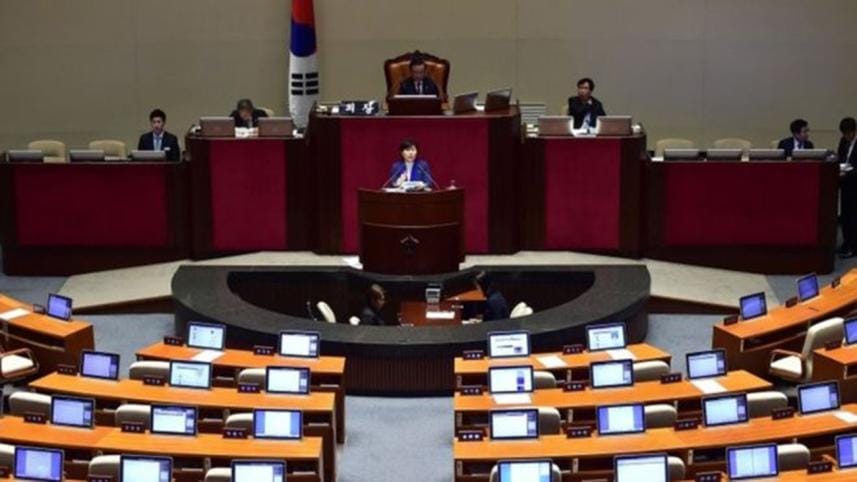S Korea 'world record filibuster' ends

South Korean opposition lawmakers have ended a parliamentary filibuster that lasted 192 hours, which is believed to have set a new world record.
They were trying to block an anti-terrorism bill which they said threatened personal freedoms.
But they gave up on Wednesday fearing a public backlash, as the prolonged anti-terror proceedings were delaying the passing of other important bills.
The previous world record of 57 hours was set by a Canadian party in 2011.
The end of the filibuster in Seoul means that a bill backed by the ruling Saenuri Party, which holds the majority of seats in parliament, will be put to a vote and is likely to be passed.
The legislation allows intelligence services to collect a wide range of personal information - including phone records - on anyone deemed to pose a security risk. Opposition parties said it would violate privacy rights and could be used to stifle political dissent.
'Dereliction of duty'
Filibustering is a parliamentary delaying tactic by which MPs drag out speeches to the end of the allocated time, so that no vote can be held.
South Korea's filibuster was spearheaded by main opposition party Minjoo which was joined by other smaller parties, and began last Tuesday, 23 February.
Their tactics included reading out lengthy academic articles in full as well as news articles and internet comments, staging elaborate and rambling monologues and even reading from George Orwell's novel 1984.
Seo Young-Kyo, a lawmaker of South Korea's main opposition Minjoo Party, delivers a speech to call for revision of a disputed anti-terrorism bill on the main floor of the parliament in Seoul on 29 February 2016.
Some lawmakers were spotted wearing trainers, while others reportedly refrained from drinking water so that they could cut down on loo breaks. Still others were seen dozing off in their seats during the marathon session.
The longest speech made was by Jung Cheong-rae, who spoke for 11 hours 39 minutes.
They would have succeeded if they had managed to hold out until the end of the parliamentary session at midnight on 10 March.
But as the days wore on they faced increasing public criticism, as the filibuster was delaying the passage of bills on North Korean human rights and electoral districts for April's general election.
But President Park Geun-hye had argued such measures were necessary and condemned the filibuster as "nothing more than a dereliction of duty".
"The National Assembly is nearly paralysed at a time when people's lives and safety are exposed to terror threats," she said in a televised speech on Tuesday, according to Yonhap.
Filibustering around the world
One of the longest individual filibusters in history came in 1957, when US Senator Strom Thurmond spoke for more than 24 hours against civil rights reforms
Texas state Senator Wendy Davis spoke for more than 10 hours in 2013 to block a bill that would shut most abortion clinics in the US state
In December 2010 Austrian Green MP Werner Kogler made a speech lasting 12 hours and 42 minutes
In 1935 US Louisiana Democrat Huey Long tried to defeat a bill by speaking for more than 15 hours, reciting recipes for Roquefort salad dressing and fried oysters
In 1936 the Independent Unionist MP Tommy Henderson spoke for almost 10 hours straight in the Parliament of Northern Ireland
 For all latest news, follow The Daily Star's Google News channel.
For all latest news, follow The Daily Star's Google News channel.
Comments